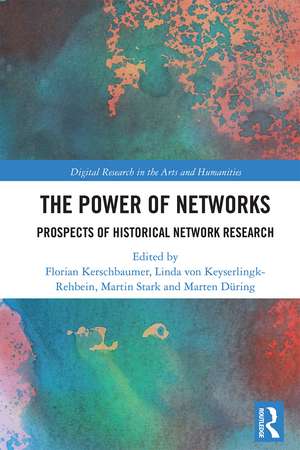The Power of Networks: Prospects of Historical Network Research: Digital Research in the Arts and Humanities
Editat de Florian Kerschbaumer, Linda von Keyserlingk-Rehbein, Martin Stark, Marten Düringen Limba Engleză Paperback – 13 dec 2021
Network data visualisations and calculations have proven to be useful tools for the analysis of mostly textual sources containing relational information, offering new perspectives on complex historical phenomena. Including case studies from antiquity to contemporary history, the book provides a clear demonstration of the opportunities historical network research (HNR) provides for historical studies. The examples presented within the pages of this volume are arranged in a way to highlight three central typological pillars of HNR: (re-)construction and analysis of historical networks; computational extraction of network data and infrastructures for data collection and exploration.
The Power of Networks outlines the history and current state of research in HNR and points towards future research frontiers in the wake of new digital technologies. As such, the book should be essential reading for academics, students and practitioners with an interest in digital humanities, history, archaeology and religion.
Din seria Digital Research in the Arts and Humanities
- 20%
 Preț: 946.39 lei
Preț: 946.39 lei - 9%
 Preț: 936.00 lei
Preț: 936.00 lei - 20%
 Preț: 247.25 lei
Preț: 247.25 lei -
 Preț: 311.33 lei
Preț: 311.33 lei -
 Preț: 309.31 lei
Preț: 309.31 lei -
 Preț: 324.93 lei
Preț: 324.93 lei -
 Preț: 311.28 lei
Preț: 311.28 lei -
 Preț: 281.45 lei
Preț: 281.45 lei -
 Preț: 325.94 lei
Preț: 325.94 lei - 17%
 Preț: 338.33 lei
Preț: 338.33 lei - 16%
 Preț: 335.37 lei
Preț: 335.37 lei -
 Preț: 460.69 lei
Preț: 460.69 lei - 26%
 Preț: 323.32 lei
Preț: 323.32 lei - 18%
 Preț: 1003.64 lei
Preț: 1003.64 lei - 31%
 Preț: 766.31 lei
Preț: 766.31 lei - 18%
 Preț: 1000.27 lei
Preț: 1000.27 lei - 31%
 Preț: 764.20 lei
Preț: 764.20 lei -
 Preț: 401.09 lei
Preț: 401.09 lei - 20%
 Preț: 1053.91 lei
Preț: 1053.91 lei -
 Preț: 384.05 lei
Preț: 384.05 lei - 28%
 Preț: 819.90 lei
Preț: 819.90 lei -
 Preț: 417.03 lei
Preț: 417.03 lei - 16%
 Preț: 339.10 lei
Preț: 339.10 lei -
 Preț: 389.38 lei
Preț: 389.38 lei -
 Preț: 381.92 lei
Preț: 381.92 lei -
 Preț: 489.26 lei
Preț: 489.26 lei -
 Preț: 469.34 lei
Preț: 469.34 lei - 18%
 Preț: 1004.55 lei
Preț: 1004.55 lei - 18%
 Preț: 1005.67 lei
Preț: 1005.67 lei - 18%
 Preț: 999.46 lei
Preț: 999.46 lei - 18%
 Preț: 1005.97 lei
Preț: 1005.97 lei -
 Preț: 489.26 lei
Preț: 489.26 lei - 18%
 Preț: 1000.27 lei
Preț: 1000.27 lei - 18%
 Preț: 1058.65 lei
Preț: 1058.65 lei - 18%
 Preț: 1000.27 lei
Preț: 1000.27 lei - 16%
 Preț: 337.84 lei
Preț: 337.84 lei - 16%
 Preț: 311.31 lei
Preț: 311.31 lei - 13%
 Preț: 338.33 lei
Preț: 338.33 lei - 30%
 Preț: 878.82 lei
Preț: 878.82 lei
Preț: 311.14 lei
Nou
Puncte Express: 467
Preț estimativ în valută:
59.56€ • 64.71$ • 50.06£
59.56€ • 64.71$ • 50.06£
Carte disponibilă
Livrare economică 31 martie-14 aprilie
Livrare express 15-21 martie pentru 31.61 lei
Preluare comenzi: 021 569.72.76
Specificații
ISBN-13: 9781032236674
ISBN-10: 1032236671
Pagini: 302
Ilustrații: 63 Illustrations, black and white
Dimensiuni: 156 x 234 x 16 mm
Greutate: 0.43 kg
Ediția:1
Editura: Taylor & Francis
Colecția Routledge
Seria Digital Research in the Arts and Humanities
Locul publicării:Oxford, United Kingdom
ISBN-10: 1032236671
Pagini: 302
Ilustrații: 63 Illustrations, black and white
Dimensiuni: 156 x 234 x 16 mm
Greutate: 0.43 kg
Ediția:1
Editura: Taylor & Francis
Colecția Routledge
Seria Digital Research in the Arts and Humanities
Locul publicării:Oxford, United Kingdom
Public țintă
PostgraduateCuprins
1. Introduction
Part I: (Re-)construction of historical networks and their analysis
5. Kinship Networks in Northwestern German Rural Society (18th/19th Centuries)
6. Mobility and Movements in Intellectual History: a Social Network Approach
3. Computational extraction of network data from large corpora
Part I: (Re-)construction of historical networks and their analysis
- Networking the Res Publica. Social Network Analysis and the Republican Rome
- Community detection and structural balance: network analytical modelling of political structures and actions in the Middle Ages
- The Value of Network Analysis in Historical Sociology: Economic and Social Relations in Medieval
in Medieval Lübeck
5. Kinship Networks in Northwestern German Rural Society (18th/19th Centuries)
6. Mobility and Movements in Intellectual History: a Social Network Approach
3. Computational extraction of network data from large corpora
- Utilizing Historical Network Analysis on Meta-data to Model East German Foreign Intelligence Cycle in the Baltic Sea Region 1975-1989
- Social and semantic network analysis in the study of religions
- Deep Networks as Associative Interfaces to Historical Research
- Networks as Gateways. Gleanings from Applications for the Exploration of Historical Data
- Historical Network Research, Digital History, and Digital Humanities
Notă biografică
Florian Kerschbaumer is Project Manager at the Danube University Krems and Lecturer at the University of Klagenfurt, Austria.
Linda von Keyserlingk-Rehbein is Curator and Head of the Document Department in the Military History Museum, Dresden, Germany.
Martin Stark is Senior Researcher at the ILS- Research Institute for Regional and Urban Development, Dortmund, Germany.
Marten Düring is Assistant Professor/Senior Research Scientist at the Luxembourg Centre for Contemporary and Digital History (C²DH) at the University of Luxembourg.
Linda von Keyserlingk-Rehbein is Curator and Head of the Document Department in the Military History Museum, Dresden, Germany.
Martin Stark is Senior Researcher at the ILS- Research Institute for Regional and Urban Development, Dortmund, Germany.
Marten Düring is Assistant Professor/Senior Research Scientist at the Luxembourg Centre for Contemporary and Digital History (C²DH) at the University of Luxembourg.
Descriere
"The Power of Networks describes a typology of network-based research practices in the historical disciplines, ranging from the use of quantitative network analysis in cultural, economic, social or political history or religious studies, to novel approaches in the Digital Humanities.
